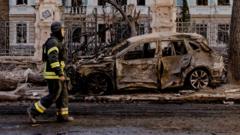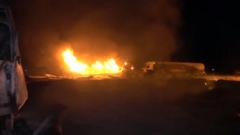Former President Donald Trump has intensified his blame toward Ukraine’s President Volodymyr Zelensky for the escalation of the war with Russia. His latest remarks come a day after a catastrophic Russian missile attack in the city of Sumy resulted in the deaths of 35 individuals and left 117 others injured. During a press briefing at the White House, Trump articulated that both Zelensky and Russian President Vladimir Putin share responsibility for the “millions of fatalities” from the conflict. He remarked, “You don’t start a war against someone 20 times your size and then hope that people give you some missiles,” criticizing Zelensky's actions leading to the war.
Trump Accuses Zelensky of War Provocation Amid Russian Assault on Civilians

Trump Accuses Zelensky of War Provocation Amid Russian Assault on Civilians
In a polarized commentary, Trump holds Ukraine's leader partly accountable for the ongoing conflict, coinciding with a deadly Russian strike.
This incident follows a highly reported assault on Sumy, classified as the deadliest civilian attack of the year, which reportedly aimed at a gathering of Ukrainian military personnel, although Moscow gave no supporting evidence for this claim. The situation escalated further with NATO's Secretary General Mark Rutte publicly supporting Ukraine and condemning Russia's actions during his visit to Kyiv.
Expressing disbelief, Trump described the Sumy attack as a “mistake,” without clarifying the information he received. He also placed blame on President Joe Biden, claiming that the war could have been averted through better governance on both sides, insisting that responsibility lies with Putin, Biden, and Zelensky. Despite such claims, Trump's historical perspective neglects the timeline of the conflict, which began in 2014 when Russia annexed Crimea before escalating to a full-scale invasion in 2022.
Further tension surfaced from Trump's past interactions with Zelensky, especially after a contentious meeting at the White House where Trump criticized the Ukrainian president for not initiating peace talks sooner. Contrasting his political posture, Trump noted a more conciliatory approach toward Russia, indicating that his administration sought negotiations that often sidelined Ukraine.
In the backdrop of diplomatic efforts and ongoing military exchanges, including Ukraine’s strikes against Russian positions post-Sumy attack, international dynamics remain fraught. Trump's envoy recently indicated a potential shift toward stabilizing US-Russia relations, while Zelensky called for Trump to visit Ukraine directly in order to witness the consequences of the war firsthand.
The tragedy of Sunday’s events, where the civilian population suffered grave losses just days before Easter, casts a shadow of urgency as diplomatic dialogues continue to evolve amidst the crisis.
Expressing disbelief, Trump described the Sumy attack as a “mistake,” without clarifying the information he received. He also placed blame on President Joe Biden, claiming that the war could have been averted through better governance on both sides, insisting that responsibility lies with Putin, Biden, and Zelensky. Despite such claims, Trump's historical perspective neglects the timeline of the conflict, which began in 2014 when Russia annexed Crimea before escalating to a full-scale invasion in 2022.
Further tension surfaced from Trump's past interactions with Zelensky, especially after a contentious meeting at the White House where Trump criticized the Ukrainian president for not initiating peace talks sooner. Contrasting his political posture, Trump noted a more conciliatory approach toward Russia, indicating that his administration sought negotiations that often sidelined Ukraine.
In the backdrop of diplomatic efforts and ongoing military exchanges, including Ukraine’s strikes against Russian positions post-Sumy attack, international dynamics remain fraught. Trump's envoy recently indicated a potential shift toward stabilizing US-Russia relations, while Zelensky called for Trump to visit Ukraine directly in order to witness the consequences of the war firsthand.
The tragedy of Sunday’s events, where the civilian population suffered grave losses just days before Easter, casts a shadow of urgency as diplomatic dialogues continue to evolve amidst the crisis.























